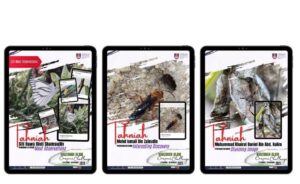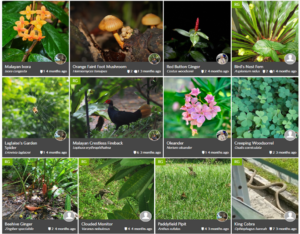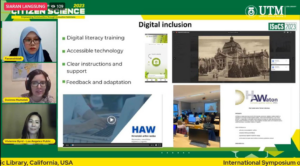Malaysian Libraries: Transforming Communities Through Citizen Science
27 أبريل 2024
Malaysian academic libraries are expanding their roles by adopting citizen science to make substantial contributions towards the UN Agenda 2030, surpassing their conventional limitations. This transition involves more than just broadening their range of services. It also entails actively participating in community outreach, environmental endeavours, and advocating for a more inclusive approach to scientific research.
UiTM Pahang’s Al-Bukhari Library: At the Forefront of Ecological Conservation Efforts
The Al-Bukhari Library at Universiti Teknologi MARA (UiTM) in Pahang has demonstrated remarkable success in its endeavours. Their “Biodiversity Beyond Books: Khazanah Alam Campus Challenge” program transcends a mere call to action. It adopts a comprehensive approach to understanding and preserving the region’s rich biodiversity. Collaborating with the University Malaya Sustainability and Development Centre (UMSDC), the Faculty of Plantation & Agrotechnology, and the Organization Biodiversity Club (ORBID), the Al-Bukhari Library initiated an impressive effort to promote citizen science both within and beyond the university.
The results of the program were impressive with 997 observations and the identification of 499 distinct species. This accomplishment was made possible through the active involvement of 52 observers and 117 identifiers. The library is pioneering environmental education and conservation by involving students, faculty, and the local community in the collection of ecological data, with plans to expand into data analysis as part of its future initiatives. This movement plays a crucial role in connecting academic research with real conservation initiatives on the ground.

USM’s Nature Challenge: Promoting and Encouraging the Practice of Environmental Stewardship
The “USM Campus Nature Challenge” was a collaborative effort led by the Universiti Sains Malaysia (USM) Library in partnership with the School of Biological Sciences (SBS) and the Centre for Global Sustainability Studies (CGSS). It aimed to create awareness about ecological concerns and biodiversity conservation within the university community by documenting biodiversity at USM’s main campus.
The project showcased the successful collaboration between the library and researchers in collecting research data, as well as the active participation of students, faculty, and staff as campus community in the project. Through this project, the USM Library was able to provide support to USM researchers, particularly in the aspects of data collection and community engagement within the campus. The librarians were also able to gain valuable insights into ongoing research endeavours. Given the successful collaboration with SBS and CGSS, the USM Library remains committed in participating in future citizen science projects. This collaboration has proven effective in promoting the involvement of non-researchers in scientific research initiatives, paving the way for more involvement in the future.

UTM’s ISoCS 2023: Empowering Communities through Innovative Solutions
The Universiti Teknologi Malaysia (UTM) hosted the International Symposium on Citizen Science 2023 (ISoCS 2023), which showcased the creative role of libraries. The event highlighted the potency of collaborative efforts, igniting inspiration, and nurturing connections among practitioners of citizen science around the globe virtually. The symposium also served as a forum for deliberating on the democratisation of science, engaging citizens in scientific research, and using technology to empower communities. Besides meeting its goals by facilitating knowledge exchange and advocating for impactful citizen science initiatives, the symposium’s influence extends to further empower communities and improve research environments.

Impact and Future Prospects
Taken together, these efforts signify a substantial change in the perception and role of academic libraries since they are now actively contributing to sustainable development and community empowerment. They are in accordance with multiple Sustainable Development Goals (SDGs) including SDG 4 (Quality Education), 11 (Sustainable Cities and Communities),15 (Life on Land) and 17 (Partnership for the Goals). Through the promotion of citizen science, these libraries are actively contributing to the growth of communities that are more sustainable, knowledgeable, and involved.
Additionally, these programs serve to connect academic research with practical implementation. They offer a practical setting for scholarly pursuits, enhancing the educational experience for both students and academics. The data gathered from these projects might be helpful for scientific research, aiding the advancement of knowledge regarding local and worldwide ecological systems.
Although these activities have a significant impact, they also encounter challenges such as the need to maintain regular community involvement, handling data efficiently, and seamlessly incorporating these projects into academic curricula. The insufficient funds in managing citizen science initiatives are also among the constraints that need to be addressed. Nevertheless, the advantages surpass these challenges. There is significant potential for expanding existing programs by working together with international organisations and utilising technology to improve data gathering and analysis.
Contributed by Nurfarawahidah B., Al-Bukhari Library, UiTM Pahang, and Cik Ramlah Che Jaafar, USM Library and Khairulbahiyah Yaakub. UTM Library